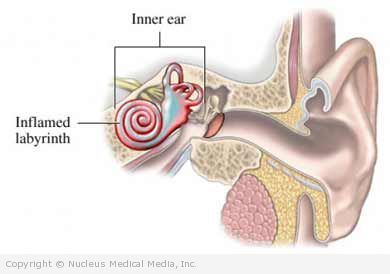Labyrinthitis – Definition
Labyrinthitis is an inflammation of the labyrinth in the inner ear. The labyrinth is a system of cavities and canals in the inner ear that affects hearing, balance, and eye movement.
Labyrinthitis – Causes
Causes include:
- Viral or bacterial infection
- Head injury
- Disease of blood vessels
- Stroke
- Nerve problems
- Autoimmune disease
- Side effects of drugs, including:
- Aminoglycoside antibiotics
- Aspirin
- Quinine
Labyrinthitis – Risk Factors
A risk factor is something that increases your chance of getting a disease or condition. Risk factors for labyrinthitis include:
- Current or recent viral infection (especially a respiratory infection)
- Allergies
- Smoking
- Drinking too much alcohol
- Stress
Labyrinthitis – Symptoms
The symptoms can range from mild to severe and last for days or many weeks. Symptoms are usually temporary, but rarely, can become permanent.
The most common symptoms are:
- Vertigo (spinning sensation)
- Dizziness
Other symptoms may include:
- Fatigue
- Nausea and vomiting
- Hearing loss
- Involuntary eye movement
- Ringing in the ear (tinnitus)
Labyrinthitis – Diagnosis
The doctor will ask about your symptoms and medical history. A physical exam will be done. Initial diagnosis is based on the symptoms and the results of your exam.
Tests may include:
- Examination of the middle ear for signs of a viral or bacterial infection
- Neurologic examination
- Maneuvers for evaluating for other causes of dizziness (Dix-Hallpike maneuver)
- Hearing tests
- Electronystagmogram — a test of eye movement
- CT scan or MRI scan — to look at structures in the head
Labyrinthitis – Treatment
Treatment may include:
Medications
- Antibiotics (only for bacterial infection)
- Medication to control the symptoms, including:
- Antiemetics — to control nausea and vomiting
- Vestibular suppressants — such as meclizine, to help control loss of balance and dizziness
- Steroids — in limited situations, to help control inflammation
- Anti-viral medication (eg, Acyclovir)
Note: Without antibiotic treatment, bacterial labyrinthitis can lead to permanent hearing loss or permanent problems with balance.
Self-care Measures
- Rest, lie still with your eyes closed in a darkened room during acute attacks.
- Avoid movement, especially sudden movement, as much as possible.
- Avoid reading.
- Resume normal activities gradually after the symptoms have cleared.
Vestibular Exercises (Vestibular Rehabilitation)
Your doctor may suggest specific vestibular exercises. These exercises use a series of eye, head, and body movements to get the body used to moving without dizziness. You may work with a physical therapist to learn these.
Emergency Treatment
In some cases, nausea and vomiting cannot be controlled. This can result in severe dehydration, which may require hospitalization to receive intravenous fluids.
Surgery
Rarely, labyrinthitis may be due to a break in the membranes between the middle and inner ear. Surgery to repair the break may be required. If a tumor is causing the condition, surgery may also be needed.
Labyrinthitis – Prevention
To reduce your risk of getting labyrinthitis:
- Seek prompt treatment for any ear problems or infection.
- Get medical advice on treating respiratory infections.
- Avoid head injury by wearing seat belts and safety helmets.
- Ask your doctor about side effects of any medication you are taking.
- Avoid alcohol.
- Take steps to prevent blood vessel disease or stroke. These include:
- Eat a low fat, low cholesterol diet.
- Don’t smoke.
- If you have high blood pressure, get it treated.
- If you have diabetes, work closely with your doctor to keep it under good control.
- With your doctor’s approval, exercise regularly.

